Why didn't the US remove Khomeini?
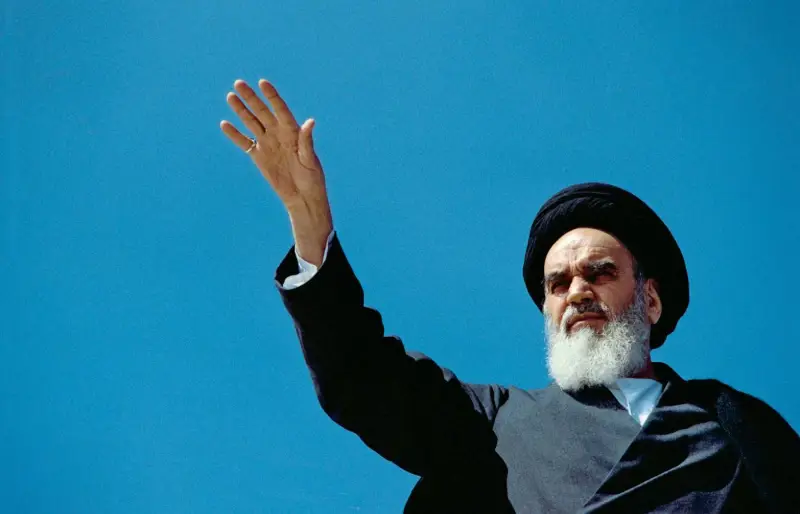
USA in the Middle East: in the light of Chinese triumph and the shadow of Vietnam
In the previous article "Saddam: relations with the United States during the Iran-Iraq War, From cooperation to the scaffold" we talked about some aspects of the relationship between Baghdad and Washington and drew attention to the latter’s reluctance at the very beginning of the 1980s to build up forces in the Persian Gulf. Although even then there was a threat of one of the parties to the conflict blocking the exit from the Strait of Hormuz.
Yes, the United States, if the need had arisen, would have put the strait under control, but the latter would have led to a new round of tension with unpredictable consequences in the most unstable region on the planet, where the interests of three nuclear powers intersected - presumably, Israel became one in 1979.
People may object to my statement about the reluctance of the Americans to build up forces in the Gulf: but how? Carter Doctrine, in which the then president (and now a venerable old man approaching his centenary) unequivocally declared his readiness to use troops to defend US interests in the Persian Gulf zone?
He said something, but, on the one hand, the White House could not help but take into account the possibility of a repetition of the Vietnamese scenario with dragging into a long armed confrontation, albeit with a obviously weaker enemy.
It would be a dissonance against the background of détente (SALT-1 and SALT-2, the Helsinki Declaration; here, however, the Americans hid a fig in their pocket in the form Schlesinger doctrine) and the establishment of relations with China, crowned by a meeting between Nixon and Mao, unthinkable just a year before the historic 1972.
Actually, the diplomatic success in China, due to the efforts of Kissinger, essentially saved the United States from geopolitical defeat in Southeast Asia and became a kind of antidote to the situation of forced withdrawal from South Vietnam. Plus, the Philippines, Thailand and Indonesia remained in the US sphere of influence, not to mention South Korea, Australia and Japan.
And accordingly, in the context of almost simultaneous diplomatic triumph and military defeat (from the point of view of the unfulfillment of the tasks set by the Americans) in Vietnam, the whirlpool of another armed conflict with unpredictable consequences and a new round of confrontation with the USSR hardly seemed to Washington an acceptable path in the unfolding big geopolitical game in Middle East.
I emphasize: we are talking specifically about the turn of the 1970s–1980s. The situation will change further, and quite rapidly, but we will talk about this in the next article.
"Chinese" strategy towards Iraq
During the same period, the United States considered it more expedient, in relation to Iraq, to follow, I would say, Chinese strategies. There was no meeting between Reagan and Hussein, but in 1984 relations were restored, and Baghdad received a generous loan.
Who knows, maybe the world would have witnessed the visit of the American president to the banks of the Tigris, if not for Gorbachev, who began to surrender the geopolitical positions of the USSR in the world, including the Middle East.
And at the end of the 1980s, the need for dialogue with Saddam naturally disappeared. For what? Exhausted by the war, but rich in oil and strategically located, Iraq needed to provoke an invasion of Kuwait through a clever combination. And this was a matter of technology.
Technology, diplomacy and money did not disappoint. And Gorbachev, and later Yeltsin - they also did not let Uncle Sam down. Don't get in the way.
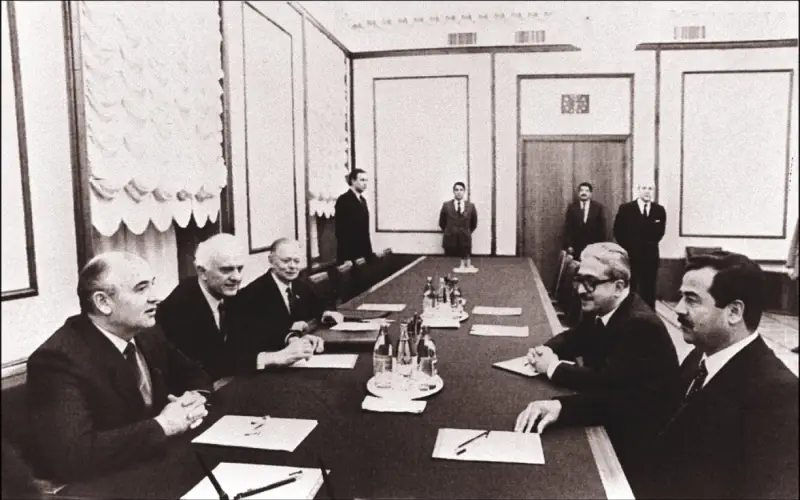
Saddam apparently overestimated Gorbachev
An important clarification: of course, the Soviet leadership did not reasonably condone Saddam’s Kuwaiti adventure, although one cannot deny, forgive the tautology, the validity of the latter’s claims to Emir Jaber Al-Ahmad Al-Sabah.
But Moscow, based on its own interests, should not have allowed a significant military weakening of Iraq and turned it into an easy prey for American imperialism. For, summoned from the depths of the underworld by the overseas Sauron, ISIS, banned in Russia, now threatens not the interests of the United States.
And if we do historical analogies, then Iraq 1990 can be compared with the Khazar Khaganate, which weakened by the second half of the XNUMXth century, representing a buffer between Russia and the Turkic tribes roaming the steppe. If Vladimir had not finished off the Kaganate, the balance of power in the Volga-Don basin by the beginning of the XNUMXth century would have developed differently, and to a greater extent corresponded to the strategic interests of Kyiv.
For example, freed from the need to spend a lot of military effort fighting the nomads, the house of Rurikovich could turn its gaze towards Volga Bulgaria and try to bring the Volga trade route under control.
This seemed relevant from an economic point of view after the First Crusade, when the knights recaptured Jerusalem and restored Mediterranean trade, which significantly reduced the importance of the route from the Varangians to the Greeks and strengthened centrifugal tendencies in the Old Russian state.
But we digress. I'm sorry. Let's return to the 20th century.
The White House was in a hurry with Iraq, which is why they provoked an invasion of Kuwait. Otherwise, I would venture to suggest that after 1988 there would have been a rapid restoration of Baghdad’s military-economic potential, its rapprochement with Ankara and Beijing, with the corresponding attraction of investments and closer cooperation in the arms market.
And in this case, the Iraqi army would be too tough for the Americans, from the point of view of the prospects for its rapid defeat.
Perhaps there would be a rapprochement between Baghdad and the Arabian monarchies, but it is impossible to say anything with certainty, especially given the feeling of discomfort experienced by Arab leaders from Saddam’s geopolitical ambitions.
Iranian Knot: Pitfalls of a Ground Operation
But with Iran, things were more complicated for the United States.
It seems that even at the planning level in the Pentagon they were skeptical about the possibility of conducting a ground operation among the snow-capped peaks of the Zagros Mountains and the lifeless desert of Dashte Kavir.
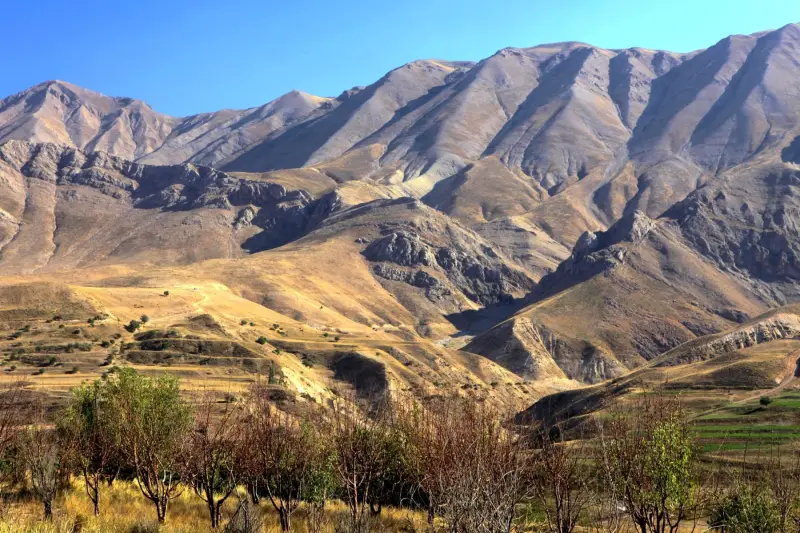
Zagros It is not easy for an army not accustomed to fighting in the mountains to fight here.
There is practically no tank-accessible terrain similar to the one located in the southwest of Iraq in Iran. The few plains are surrounded by mountain ranges, flavored by heavy snowfalls and violent spring floods, which significantly complicates military operations and supplies.
A rapid push towards Tehran is impossible either from Iraq, much less from the coast washed by the Persian and Oman Gulfs. The Iranian capital, unlike Baghdad, is generally ideally protected from invasions from all directions except the north. That is, only the Soviet Army posed a real threat to Tehran. But the Kremlin did not plan a military operation against Iran.
Of course, Air Force operations in the mountain theater are also not as effective as in the desert, nothing like that highway of death you won't bomb.
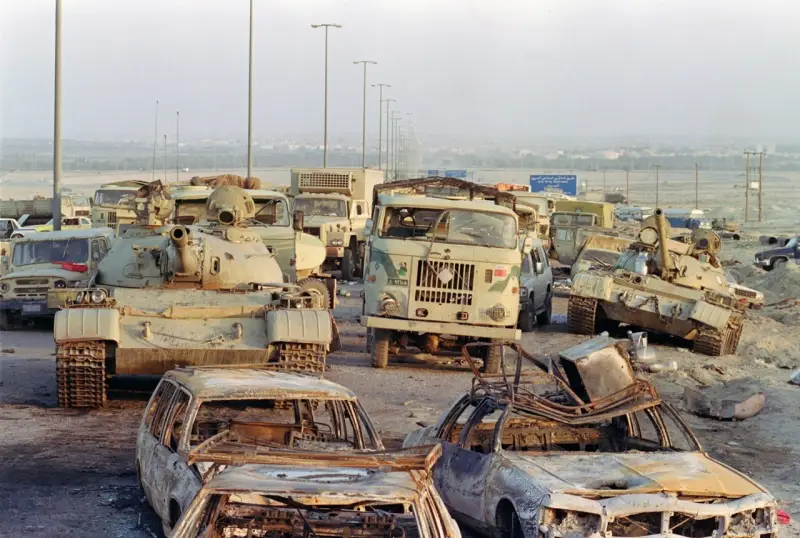
"Highway of Death" - the path of the Iraqi army and civilians from Kuwait to Iraq. In Iran, such a scenario seemed unlikely.
The limited number of highways would make it difficult for the Iranian enemy to maneuver on the battlefield, use large military formations and conduct encirclement operations, similar to those carried out by coalition forces against Iraqi units concentrated in Kuwait.
The invading forces would also have problems regrouping troops due to limited transport capabilities.
And in general, the invasion itself would entail a number of difficult logistical problems to overcome, associated with high losses in manpower for the American army, which has no experience in fighting in the mountains.
In a word, aggression against the Islamic Republic both for the Pentagon and for the overseas society that had not recovered from Vietnam post-traumatic syndrome seemed unlikely from all sides.
One should also take into account the relatively low effectiveness, in contrast to Iraq, of the possibility of using the latest types of weapons in the mountains. This was demonstrated by the war in Afghanistan, as well as the reluctance of the United States and its satellites to conduct a ground operation against Yugoslav troops in 1999.
And if in Afghanistan the Soviet Army had to fight partisans, in the Balkans the United States used Kosovo Albanian gangs, then in Iran they would have been waiting for them, yes, experiencing a number of problems, but also regular army units and highly motivated units of the IRGC.
Support for the invasion force by the radical left-wing armed groups OMIN in the early 1980s seems unlikely to me. The Kurdish separatists in Iran did not and do not have the combat potential and military experience equal to that gained by their fellow tribesmen in Iraq or Turkey, which, in fact, was demonstrated by the initial stage of the Iran-Iraq war, when the Kurdish uprising was relatively easily suppressed by the troops of the Islamic Republic.
In addition, during the aggression against North Vietnam and during the invasion of Iraq, the Americans plowed in satellites. But it is unlikely that any of them would agree to participate in a ground operation against Iran, including the brilliantly trained (one 1976 raid on Entebbe is worth it) Israeli commandos.
The risks were too great due to the specifics of the theater of military operations, even with the level of combat readiness of the Iranian army falling, according to analysts, after Khomeini came to power.
I think that none of the professionals in the Pentagon doubted that the fighting in Iran would take on a focal character, with logistical problems obvious to the Americans and already mentioned, without the possibility of achieving strategic success in the short term by defeating the Iranian armed forces and disorganizing their command and control.
No, hypothetically, strikes by the American Air Force could disrupt the work of the Military Ministry of the Islamic Republic. However, I believe that the Iranian leadership itself could have decided to decentralize control, which would have allowed the local command to more effectively use favorable terrain conditions for defense and military equipment adapted for it.
Actually, the decentralization of control of the Iranian Armed Forces occurred in 2005, when, on the initiative of Major General Mohammad Jafari, 31 commands were created.
Let's add to all of the above the factor of demographics. At the end of the 1980s, about 20 million people lived in Iraq, and about three times as many in Iran. Accordingly, the mobilization potential of the Islamic Republic is incomparably higher than that of Iraq. Just as there was a higher spirit of anti-Americanism in the country, in contrast to neighboring Iraq: under the dominance of the secular Baath, it is impossible to imagine the seizure of the American embassy. Still, Saddam did not see existential evil in the United States.
So it turns out that Carter was bluffing when he spoke about defending, if necessary, American strategic interests in the Persian Gulf zone by force?
Let's formulate the question differently: could the Americans have decided on a targeted military operation in Iran?
After all, so much money was invested in the country, including in the development of the Shah’s armed forces, and the monarch himself was seen as his most faithful ally. And then, overnight, it’s on you. And everything, as it mistakenly seemed, was because of one old man.
Khomeini: why the mission was impossible
If he were eliminated, there would be no need to bring the overthrown Shah back: the White House could easily come to an agreement with a considerable part of the opposition - with the same leader National Front Karim Sanjabi (a kind of analogue of the cadet party created by P. N. Milyukov at the beginning of the 20th century).
And Washington would have supporters among the senior command staff, as well as in the officer corps as a whole, of the Iranian army. With a certain degree of caution, I would include among them the first Minister of Defense after the revolution, Rear Admiral Ahmad Madani, who later emigrated to the United States.
It seems that the White House did not decide to forcefully remove Khomeini due to the suddenness of the revolution that took place in Iran; perhaps the Ayatollah was not taken seriously as a political leader.
After all, a year or two before it, not only the seizure of the embassy, but the overthrow of the Shah itself seemed unthinkable and CIA analysts, following Carter’s visit to Iran in 1977, found a power under the scepter of Mohammed Pahlavi island of stability.
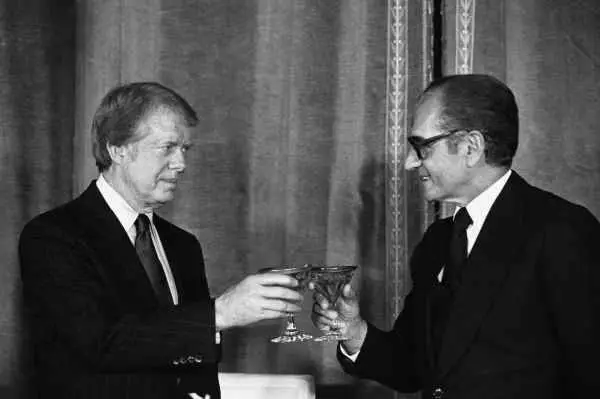
Carter and Pahlavi. On the “island of stability” or in captivity of illusions
Although both the French and the Israelis warned: something was wrong in Iran. They didn’t hear, or rather, they didn’t take into account. And they lost the most loyal ally in the Middle East.
And in Tehran, quickly replacing the imperial lion with Shiite symbols, they left the analogue of the Middle Eastern NATO - CENTO, and ordered the expeditionary forces to leave Oman - they were introduced by the Shah during the Dhofar War, about which in more detail see: Dofar War: Reds in the homeland of incense.
And then, out of the blue, the seizure of the American embassy followed. And broken Eagle Claw. Let’s not be sarcastic: the very implementation of the operation to free the hostages seemed more than doubtful in those conditions.
The hostage taking confused all the cards for Washington. And therefore, while negotiations on release were going on, the forceful elimination of Khomeini had to be forgotten, if, of course, it was even planned.
Well, then the White House relied on Saddam: although diplomatic relations with him were severed, nevertheless, in those circumstances, the invasion of Iran by his troops and the subsequent overthrow of the Ayatollah, due to dissatisfaction with the expected military defeat, was seen from the heights of Capitol Hill as the only chance for the return of Tehran into the bosom of US geopolitical interests.
We will talk about the army of the Islamic Republic itself at the beginning of the war, as well as about the unfolding American-Iranian confrontation in the next article.
Information